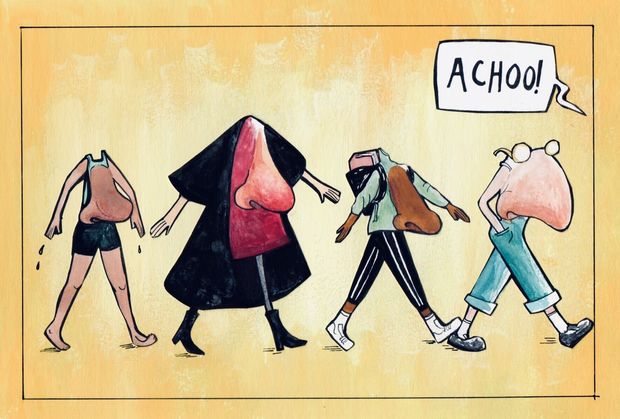Finding connection within our communities
In her latest column on ‘connection’, Ella Gold explores the unexpected advantages of living locally
Fun fact: I’m a Londoner. Now, in reality, this fact is neither fun nor even particularly interesting. Rather, it is something I’ve learned to carry around Cambridge with more shame than anything else. Endless sighs, eye rolls, and ‘not another one’ comments during fresher’s week and beyond have taught me that belonging to such a huge majority is, quite frankly, boring.
It’s not surprising, considering that Cambridge is teeming with Londoners in disguise. The very first person I met in Cambridge on move-in day happens to live five minutes away from me and went to school with my brother. At the time, I was blown away by this amazing coincidence. I then went to a college freshers’ event, realised I share similar connections with about half my year, and quickly revised my initial amazement.
"You learn to develop your own mini-cities within the city, smaller areas in which you feel at home."
Despite discovering such a huge concentration of fellow city dwellers, I soon found myself in a majority non-Londoners friendship group, the largest subsection within which is Northerners. After two years in said friendship group, I am here to warn the non-Northerners among you that Northern pride is a truly terrifying thing. Imagine shorts and t-shirts in sub-zero temperatures; envision the sound of disgruntled sighs each time you fetch your mate a glass of water (hard water is definitely superior to soft water but whatever); picture walking in to your college husband’s room to find a Heron Foods carrier bag (it’s a northern supermarket) pinned to his wall (I’m looking at you, Arthur).
When one of my Northern friends who, I should mention, lives in a tiny village, visited me in London, she was surprised by the sense of community she found. Within ten minutes of walking, we bumped into my old ballet teacher, who spends her time these days wandering my area offering children’s shoes to unsuspecting strangers (despite having no children herself…). My friend was amazed that, living in London, I could just bump into someone that I knew. She was even more surprised when I told her this was an everyday occurrence.
Community in big cities is certainly a unique thing. London has a terrible reputation for its unfriendliness, which has certainly fed into my experience of the city. If someone I don’t know approaches me on public transport, I assume a) I’ve done something to offend them, b) they’re about to uncomfortably hit on me with some charmingly sexist one-liners, or c) I’m about to be murdered. Two out of these three have, on occasion, proven to be true, but I’ve also had a free life coaching session, been lent an electric scooter, learned some Greek and unwittingly taken part in a social experiment. It’s not all bad.
London’s reputation is, in many ways, an over-simplification. When you live in such a large city, communities are not absent, they merely operate on smaller scales. You learn to develop your own mini-cities within the city, smaller areas in which you feel at home. Drop me anywhere in South London and I wouldn’t know what to do with myself, but within the small area in which I was born, grew up, and have lived all my life, my familiarity with, and connection to the place is strong.
Having said this, my connection to my area hasn’t always extended to the people themselves. Lockdown has made me realise how few of my neighbours I actually knew – if anything, I think I knew the cats of the street better than the people, although this might say more about me than anything else.
I’ve noticed a shift in London’s stereotypical attitudes in my area during lockdown. The simplest manifestation of this is smiling – Londoners don’t smile at strangers in the street, but, recently, on my daily walks, I’ve found myself sharing more of these silent moments of acknowledgement with passers-by. My street walks have also helped me connect to my area by exploring parts of it I’d never seen before. The NHS clap has marked a similar shift in connection with my community. It happens nightly in my area and, while the motivation for such regularity ebbs and flows, I’ve found this tradition to be so important for strengthening our sense of community. I’ve consequently met more neighbours under lockdown than I ever knew before. Such regular interaction is an act of solidarity in a world that so often encourages us to exist apart from one another. It reminds us that we face this pandemic as communities, not as individuals.
Whether you’re a fellow, shame-wracked Londoner like myself, or come from a village nobody’s heard of, I think we can all learn an important lesson from these times: that sometimes the most valuable support systems exist right under our noses. Being forced to remain local compels us to seek connection in the homes of those who, until now, we may have believed we shared no more than a postcode with.
 News / Cambridge study finds students learn better with notes than AI13 December 2025
News / Cambridge study finds students learn better with notes than AI13 December 2025 News / Cambridge Vet School gets lifeline year to stay accredited28 November 2025
News / Cambridge Vet School gets lifeline year to stay accredited28 November 2025 Science / Did your ex trip on King’s Parade? The science behind the ‘ick’12 December 2025
Science / Did your ex trip on King’s Parade? The science behind the ‘ick’12 December 2025 News / Uni Scout and Guide Club affirms trans inclusion 12 December 2025
News / Uni Scout and Guide Club affirms trans inclusion 12 December 2025 Arts / Modern Modernist Centenary: T. S. Eliot13 December 2025
Arts / Modern Modernist Centenary: T. S. Eliot13 December 2025










